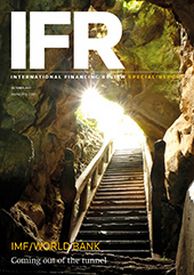Taper talk, hike hypotheses
While some degree of rowing back on easing measures is anticipated, just how and when the US authorities will act remains uncertain, although the repercussions will be felt far and wide

Things are still far from normal. In fact, what was once deemed to constitute normality may never return. There are signs, however, that the world is beginning to emerge from the darkest days of the past 18 months, although there is no doubting it will be an uphill struggle. The coronavirus pandemic saw the global economy contract by 3.3% in 2020, according to IMF estimates. While this was not as steep a drop as at one time feared, it still marked the worst recession since World War II. But the fund sees a recovery in progress, with...Read more
To purchase printed copies or a PDF of this report, please email leonie.welss@lseg.com and shahid.hamid@lseg.com
While some degree of rowing back on easing measures is anticipated, just how and when the US authorities will act remains uncertain, although the repercussions will be felt far and wide
Sub-Saharan Africa is expected to recover more slowly from the Covid-19 crisis than other regions. Its countries need to undertake wholesale debt restructuring to bring their indebtedness down and avoid defaults.
The World Bank Group plans to deliver record levels of climate finance over the next five years to support client countries in efforts to reduce the trajectory of emissions, strengthen adaptation and foster resilience. Alignment of effort from all parties will be key
The following is a copy of a speech that was due to be made by Eugene Rotberg, the World Bank’s former treasurer, on the occasion of a reunion dinner to celebrate the 50th anniversary of the World Bank’s treasury department. The dinner had been scheduled to take place in April 2020 but, thanks to the coronavirus pandemic, that was not possible. Those involved are hoping to reschedule the dinner but, in the meantime, this is what Gene was planning to say.
Eugene Rotberg was treasurer of the World Bank from 1968 to 1987, a period of immense change for the institution as it massively diversified its funding and created what was to become the largest swaps programme in the world. He talks to IFR about that period. Robert McNamara asked you to become his treasurer shortly after taking over at the World Bank in 1968. What was your response? Treasurer? Stunned. Hardly knew a debit from a credit. But, for me, it was the ultimate Robin Hood job – facilitating the distribution of wealth from rich to poor...
The international community faces a race against time to donate their special drawing rights to poorer countries. But they want greater transparency before doing so
China's debt-funded expansion has been the envy of many over a number of years. But it now faces a stark choice: growth or deleveraging.
The election of anti-establishment candidates has created opportunities for investors, but not without peril
Asia’s economies appear to have weathered the Covid-19 pandemic thanks to decisive fiscal and monetary action, although concerns remain about the sustainability of growth, mounting fiscal deficits and the stability of local currencies
Bangladesh has enjoyed one of the world's fastest growing economies for the last decade and weathered the Covid-19 storm well compared to its regional peers but faces a huge issue in coming decades – rising sea levels.